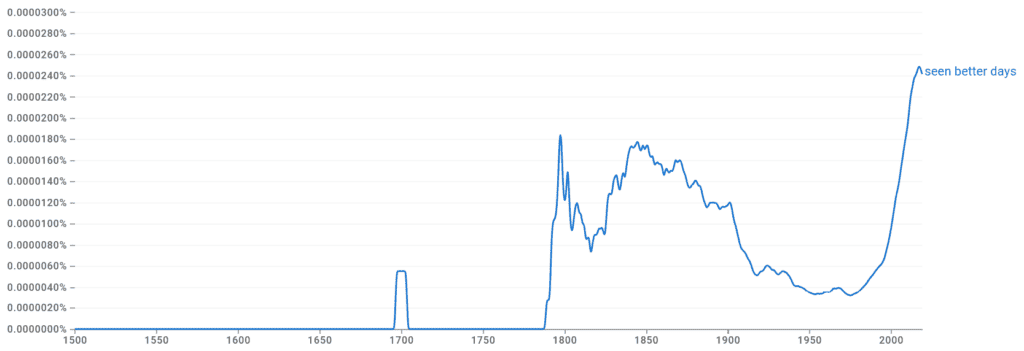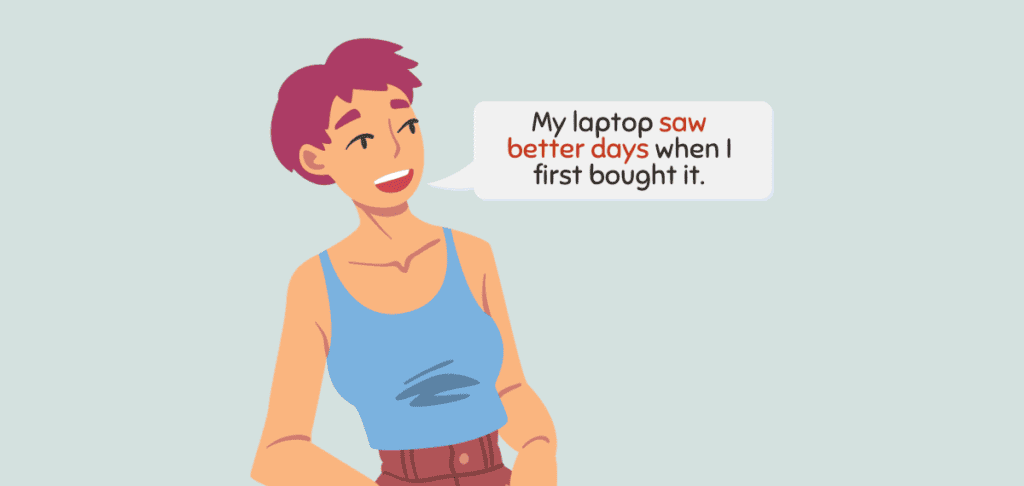Seen better days is a phrase we often reserve for something that looks old or worn out. It’s like when we have an old toy or shirt that was once new but is now old and a bit damaged. At its heart, this idiom conveys a sense of wear and tear, suggesting that something or someone was once in a better state or condition.
Curious about idioms? Well, they’re the little zingers in the English language that often convey meanings beyond the literal interpretations of their words. They’re the unsung heroes that add spice and zest to our dialogues, making them resonant and memorable.
If your enthusiasm for these linguistic nuggets has, well, seen better days, perk up! Dive in as we unwrap the origin, meaning, and examples of this phrase, promising you a refreshing linguistic journey.
Seen Better Days Meaning Explained

Seen better days is a way to say that something is not as new or good as it once was. Imagine an old, faded shirt that was once bright and colorful. Or think of a popular song from years ago that people don’t listen to much now. This phrase helps us express that things have changed and are not as fresh or popular as before. In simple words, it means something isn’t as good as it used to be.
Think about that old swing set in the backyard that hasn’t been touched in a decade or your favorite sweater from fifteen years ago that you wear all the time despite the fact it’s full of holes.
What Does It Mean When You Say, “I’ve Seen Better Days”?
When you say, “I’ve seen better days,” you’re expressing that you’ve experienced better times or felt better in the past compared to the present moment. This phrase can refer to physical well-being, emotional state, or even circumstances. For instance, if someone asks how you’re feeling when you’re tired or unwell, you might reply with “I’ve seen better days” to convey that you’re not at your best.
Using Different Tenses
- Seen: My old backpack has seen better days.
- Saw: My old backpack saw better days when I was in college.
- See: I think that this old house will see better days once it’s renovated.
Seen Better Days Origin and Etymology

The saying “seen better days” has quite an old and interesting history. It’s like discovering an old coin and realizing it’s from centuries ago! This phrase comes from the time of William Shakespeare, a very famous writer from a long time ago. Many of our common sayings today actually come from his writings.
This particular saying first appeared in a play called Sir Thomas Moore from the 1590s. At first, people didn’t know who wrote it, but later, they found out Shakespeare had a hand in it. He liked this phrase so much that he used it again in another play, Timon of Athens, in the 1600s. So, when we use “seen better days,” we’re actually using words that have been around for a very long time!
Synonyms for Seen Better Days
- Worn out
- Run-down
- Past its prime
- Dilapidated
- Over the hill
Using Seen Better Days in a Sentence

- My grandmother’s china has seen better days, but I still love it.
- This park used to be vibrant but has seen better days.
- The old building saw better days in the ’80s.
- My favorite jeans have seen better days, but I can’t part with them.
- The company will see better days once it completes the restructuring.
- This rusty bike has definitely seen better days.
- The old theater has seen better days; now it’s just a ruin.
- She says her energy levels have seen better days since becoming a parent.
- My laptop saw better days when I first bought it.
- This legislation has seen better days; it’s time for an update.
The Sun Will Rise Again: Renew Your Idiom Game
Think of that worn-out couch or the days you felt learning idioms was a steep hill to climb. Always recall: after every sunset, there’s a sunrise waiting. By embracing idioms, you add zest to your chats and charm to your writings. So keep that curiosity alive and keep diving into the world of idioms. After all, today might be the day you find that perfect phrase you’ve been searching for. Cheers to brighter linguistic adventures ahead!
Want to know more idioms? Check out some others we covered:
